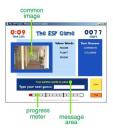 Peter O pointed me to a new phenomenon on the web that I’ve been meaning to blog for a while. That is the leveraging of human players for tasks that can’t be easily automated. Perhaps the best example is the ESP Game. The online game is described in “How to Play”:
Peter O pointed me to a new phenomenon on the web that I’ve been meaning to blog for a while. That is the leveraging of human players for tasks that can’t be easily automated. Perhaps the best example is the ESP Game. The online game is described in “How to Play”:
The ESP Game is a two-player game. Each time you play you are randomly paired with another player whose identity you don’t know. You can’t communicate with your partner, and the only thing you have in common with them is that you can both see the same image. The goal is to guess what your partner is typing on each image. Once you both type the same word(s), you get a new image.
The game (and its Google Image Labeler spin-off) leverages fun to get image tagging done. Remember when we thought computer image recognition would do that? Now we are using online games to make it fun for humans to do what we do best – instant complex judgements about the visual. If you get enough people playing we could make serious inroads into tagging the visual web.
What is impressive about ESP is what a simple and powerful idea it is and this is Luis von Ahn‘s second sweet contribution, the first one being CAPTCHA and reCAPTCHA.
While it isn’t quite as clean, a generalized version of the idea of people power is Amazon’s Mechanical Turk. The idea is that people can,
Complete simple tasks that people do better than computers. And, get paid for it. Learn more.
Choose from thousands of tasks, control when you work, and decide how much you earn.
Developers can register tasks, people can work on HITs (Human Intelligence Tasks) and get paid for the work, and Amazon can become the largest labour market for small tasks.
As an introduction to von Ahn’s specific area of the field (human-computation through gaming), his speech at Google is brilliantly accessible.